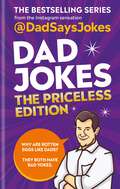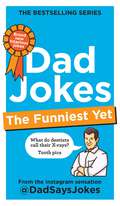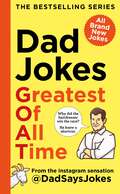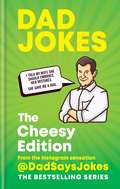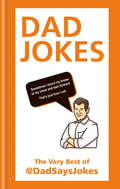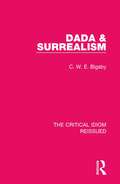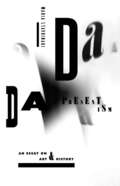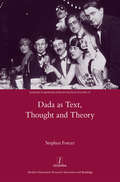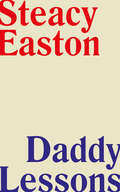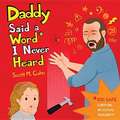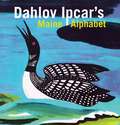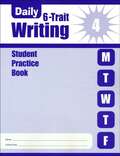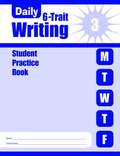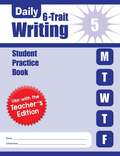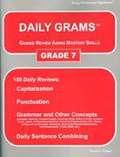- Table View
- List View
Dad Jokes: The Priceless Edition (Dad Jokes #5)
by Dad Says JokesTHE NEW COLLECTION FROM THE SUNDAY TIMES BESTSELLERS @DADSAYSJOKESQ: What do cars spread on their toast?A: Traffic jam.The hit Instagram page @DadSaysJokes returns with an all-new batch of hilarious dad jokes to share with friends and family. Back by popular demand, with hundreds of gags for every occasion, Dad Jokes: The Priceless Edition is the perfect gift for Father's Day, birthdays, Christmastime and beyond.@DadSaysJokes is a community-run Dad jokes network on Instagram, Facebook and Twitter, with over 5 million followers, inspired by the daily jokes of author Kit Chilvers' dad, Andrew. Every day, followers submit their jokes and the team picks their favourites - or Dad just drops in his own zinger! Kit, a young social networking influencer, started his career at the tender age of 14 when he created his original platform, Football.Newz. He has since added another fourteen platforms, including @PubityPets and monster meme Instagram page @Pubity with its 31 million followers. This is his fifth book.
Dad Jokes: The newest collection from the Instagram sensation @DadSaysJokes (Dad Jokes #7)
by Dad Says JokesThe must-have joke collection from the Instagram sensation @DadSaysJokesQ: How can you tell a pig is hot? A: It's bacon. The iconic Instagram page @DadSaysJokes returns with a fresh batch of dad jokes to share with your nearest and dearest. Packed with jokes so bad that they're good, Dad Jokes: The Funniest Yet is the perfect gift for every occasion. @DadSaysJokes is a community-run Dad jokes network on Instagram, Facebook and Twitter, with more than 8 million followers, inspired by the daily jokes of author Kit Chilvers' dad, Andrew. Every day, followers submit their jokes and the team picks their favourites - or Dad just drops in his own zinger! Kit, a young social networking influencer, started his career at the tender age of 14 when he created his original platform, Football.Newz. He has since added another fourteen platforms, including @PubityPets and monster meme Instagram page @Pubity with over 40 million followers. This is his seventh book.
Dad Jokes: The newest collection from the Instagram sensation @DadSaysJokes (Dad Jokes #7)
by Dad Says JokesThe must-have joke collection from the Instagram sensation @DadSaysJokesQ: How can you tell a pig is hot? A: It's bacon. The iconic Instagram page @DadSaysJokes returns with a fresh batch of dad jokes to share with your nearest and dearest. Packed with jokes so bad that they're good, Dad Jokes: The Funniest Yet is the perfect gift for every occasion. @DadSaysJokes is a community-run Dad jokes network on Instagram, Facebook and Twitter, with more than 8 million followers, inspired by the daily jokes of author Kit Chilvers' dad, Andrew. Every day, followers submit their jokes and the team picks their favourites - or Dad just drops in his own zinger! Kit, a young social networking influencer, started his career at the tender age of 14 when he created his original platform, Football.Newz. He has since added another fourteen platforms, including @PubityPets and monster meme Instagram page @Pubity with over 40 million followers. This is his seventh book.
Dad Jokes: The newest collection from the Instagram sensation @DadSaysJokes (Dad Jokes #8)
by Dad Says JokesTHE EIGHTH COLLECTION FROM INSTAGRAM SENSATION @DADSAYSJOKESQ. What do astronauts put on their toast?A. Space jam!Instagram sensation @DadSaysJokes returns with another superb selection of hilariously cheesy jokes that will have your friends and family laughing and groaning in equal measure.@DadSaysJokes is a community-run Dad jokes network on Instagram, Facebook and Twitter, with more than 8 million followers, inspired by the daily jokes of author Kit Chilvers' dad, Andrew. Every day, followers submit their jokes and the team picks their favourites - or Dad just drops in his own zinger!From cheesy one-liners to playful puns, this is the perfect gift for dads who love to be the life of the party, as well as anyone who wants to relive a childhood full of 'bad' dad jokes.
Dad Jokes: The newest collection from the Instagram sensation @DadSaysJokes (Dad Jokes #8)
by Dad Says JokesTHE EIGHTH COLLECTION FROM INSTAGRAM SENSATION @DADSAYSJOKESQ. What do astronauts put on their toast?A. Space jam!Instagram sensation @DadSaysJokes returns with another superb selection of hilariously cheesy jokes that will have your friends and family laughing and groaning in equal measure.@DadSaysJokes is a community-run Dad jokes network on Instagram, Facebook and Twitter, with more than 8 million followers, inspired by the daily jokes of author Kit Chilvers' dad, Andrew. Every day, followers submit their jokes and the team picks their favourites - or Dad just drops in his own zinger!From cheesy one-liners to playful puns, this is the perfect gift for dads who love to be the life of the party, as well as anyone who wants to relive a childhood full of 'bad' dad jokes.
Dad Jokes: The perfect gift from the Instagram sensation @DadSaysJokes
by Dad Says JokesTHE NEW BOOK IN THE BESTSELLING SERIESThe most followed dad jokes page on Instagram, @DadSaysJokes, returns with another collection of hilariously cringe-inducing gags for you to share with friends and family.@DadSaysJokes is a community-run Dad jokes network on Instagram, Facebook and Twitter, with over 3 million followers, inspired by the daily jokes of author Kit Chilvers' dad, Andrew. Every day, followers submit their jokes and the team picks their favourites - or Dad just drops in his own zinger! Kit, a young social networking influencer, started his career at the tender age of 14 when he created his original platform, Football.Newz. He has since added another nine platforms, including @PubityPets and monster meme page @Pubity with its 25 million followers. This is his third book.I TOLD MY WIFE SHE SHOULD EMBRACE HER MISTAKES.SHE GAVE ME A HUG.
Dad Jokes: The perfect gift from the Instagram sensation @DadSaysJokes
by Dad Says JokesTHE NEW BOOK IN THE BESTSELLING SERIESThe most followed dad jokes page on Instagram, @DadSaysJokes, returns with another collection of hilariously cringe-inducing gags for you to share with friends and family.@DadSaysJokes is a community-run Dad jokes network on Instagram, Facebook and Twitter, with over 3 million followers, inspired by the daily jokes of author Kit Chilvers' dad, Andrew. Every day, followers submit their jokes and the team picks their favourites - or Dad just drops in his own zinger! Kit, a young social networking influencer, started his career at the tender age of 14 when he created his original platform, Football.Newz. He has since added another nine platforms, including @PubityPets and monster meme page @Pubity with its 25 million followers. This is his third book.I TOLD MY WIFE SHE SHOULD EMBRACE HER MISTAKES.SHE GAVE ME A HUG.
Dad Jokes: The very best of @DadSaysJokes
by Dad Says JokesFrom the most-followed dad jokes page on Instagram, @dadsaysjokes, comes a collection of hilariously cheesy jokes that will leave your friends and family laughing and groaning in equal measure.This is the perfect gift for dads who want to expand their repertoire and anyone who fancies reminiscing about a childhood full of these no-nonsense 'bad' puns.Here are a couple of tasters:Q: Why do cows have hooves instead of feet?A: Because they lactose.Q: Are you today's date?A: Cuz you're 10/10.
Dad Jokes: The very best of @DadSaysJokes
by Dad Says JokesFrom the most-followed dad jokes page on Instagram, @dadsaysjokes, comes a collection of hilariously cheesy jokes that will leave your friends and family laughing and groaning in equal measure.This is the perfect gift for dads who want to expand their repertoire and anyone who fancies reminiscing about a childhood full of these no-nonsense 'bad' puns.Here are a couple of tasters:Q: Why do cows have hooves instead of feet?A: Because they lactose.Q: Are you today's date?A: Cuz you're 10/10.
Dada & Surrealism (The Critical Idiom Reissued #22)
by C. W. BigsbyFirst published in 1972, the work provides an introduction to Dada and Surrealism. It explores the two movements and their cultural significance. It also looks at those who called themselves Dadaists and Surrealists, including their aims and achievements. In doing so, the book identifies the meaning that the two terms have acquired, which is often remote from the claims advanced by the chief adherents of each movement. This book will be a valuable resource to those studying Dada and Surrealism and its relationship to modern literature.
Dada Presentism: An Essay on Art and History
by Maria StavrinakiDada is often celebrated for its strategies of shock and opposition, but in Dada Presentism, Maria Stavrinaki provides a new picture of Dada art and writings as a lucid reflection on history and the role of art within it. The original (Berlin-based) Dadaists' acute historical consciousness and their modern experience of time, she contends, anticipated the formulations of major historians such as Reinhart Koselleck and, more recently, François Hartog. The book explores Dada temporalities and concepts of history in works of art, artistic discourse, and in the photographs of the Berlin Dada movement. These photographs--including the famous one of the First International Dada Fair--are presented not as simple, transparent documents, but as formal deployments conforming to a very concrete theory of history. This approach allows Stavrinaki to link Dada to more contemporary artistic movements and practices interested in history and the archive. At the same time, she investigates what seems to be a real oxymoron of the movement: its simultaneous claim to the ephemeral and its compulsive writing of its own history. In this way, Dada Presentism also interrogates the limits between history and fiction.
Dada as Text, Thought and Theory
by Stephen ForcerThe Dada movement, revered as perhaps the purest form of cultural subversion and provocation in 20th-century Europe, has been a victim of the readiness with which cultural historians have swallowed its own propaganda. Based on extensive close analysis of French-language Dada work in its original form, and offering English translations throughout, this major reappraisal looks at a broad range of media and topics - including poetry, film, philosophy, and quantum physics - in order to get beyond Dada's typecasting as avant-garde anti-hero. Work by women writers and other marginalized figures combines with that of canonical Dadaists to present Dada in a radically new set of guises: poetic and textually subtle; intellectually and philosophically meaningful; peaceable and quasi-Buddhist; and, perhaps most uncomfortably of all, conformist and reactionary.
Daddy Lessons
by Steacy EastonCowboy erotica meets Kathy Acker in this smart, raunchy look at a queer sexual awakeningSteacy Easton grew up Mormon, queer, and Autistic in the West. This book traces the people and spaces that made them who they are: the Mormon church, an Anglican boys’ boarding school where they were sent to be ‘reformed’ and where they were abused by a teacher, and then, later on, rodeos and bathhouses and mall bathrooms. The world Easton describes is one in which desire is complicated, where men – ‘daddies’ – can be loving and they can be abusive, and there isn’t always a clear distinction. Easton explores the essential texts of their sexuality, from Eve Kosofsky Sedgwick to Neil LaBute, Kip Moore to Lorelei James, and delves into their own encounters as they came of age. These daddy lessons are blunt about the pleasures of disobedience, slippery and difficult, revelling in the funk of memory and desire."In dangerous times, Daddy Lessons dares to complicate the question of what children desire, including things that they probably shouldn’t, and that adults must not exploit or manipulate. Except they do. Steacy Easton's meditations follow how such desires and disasters secrete an aesthetic and a self, and how something vivacious can spring from that muck, something like this book itself, smutty and shining and garlanded in jonquils." – Carl Wilson, author of Let's Talk About Love: A Journey to the End of Taste"Daddy Lessons is a cocky and tender reclamation of childhood and teenage wanting." – Vivek Shraya, author of I’m Afraid of Men and People Change"Steacy writes about the queer pleasure-seeking body in ways both fresh and eminently familiar." – Jordan Tannahill, author of The Listeners
Daddy Said a Word I Never Heard
by Scott M. CohnThe second title in the uproarious Daddy Series may be the first kid-friendly, kid-safe picture book about bad language!Features Read-Aloud/Read to Me functionality, where available.Daddies know all kinds of fun words, but how can a kid know which words are good and which ones are BAD? In this refreshingly authentic story that will resonate with every modern family, one little girl takes Daddy's accidental language lessons to school...and learns a very different lesson from her teacher!
Daffodil class 8 - JCERT
by Jharkhand Council of Educational Research and Training RanchiThe Class VIII English textbook "Daffodil," developed by JCERT, focuses on enhancing students' language proficiency and communication skills through engaging prose and poetry. The book covers various themes, including family, neighborhood, patriotism, imagination, sports, technology, cultural heritage, adolescence, and self-development. Stories like Kali and the Rat Snake and poems such as Wordsworth’s Daffodils and A.P.J. Abdul Kalam’s Mother are included to inspire reflection and creativity. The textbook encourages interactive learning, with exercises in comprehension, vocabulary, grammar, and creative writing, while also integrating real-life experiences and technology through QR codes for extended learning.
Dahlia class 7 - JCERT
by Jharkhand Council of Educational Research and Training RanchiThe book Dahlia: English Textbook for Class VII focuses on building English language skills for learners in a communicative and engaging manner. Designed by the Jharkhand Council of Educational Research and Training, it includes diverse themes like self, family, friendship, national diversity, world culture, and science. The book features prose, poetry, and various activities meant to develop language proficiency through contextual and interactive learning. Chapters include comprehension exercises, vocabulary building, grammar usage, and creative tasks. It also emphasizes critical thinking and understanding through group discussions, role-playing, and projects related to social, cultural, and educational themes.
Dahlov Ipcar's Maine Alphabet
by Dahlov IpcarThis charming ABC book from Maine artist Dahlov Ipcar contains an original illustration done especially for this edition, her first new children's book illustration in more than twenty years. The Maine wildlife and coastal scenes are near and dear to her heart, and this new book serves as a kind of love letter to her home state where she lived and worked for almost seventy-five years, where, as she writes, A is for animals, wild and free, and W is for woodlands of wonder for you and for me.
Daily 6-Trait Writing
by Evan MoorGive your fourth-graders the fun and focused writing practice they need to become to become strong and successful writers. The 125 engaging, 10- to 15-minute lessons support any writing program.
Daily 6-Trait Writing Third Grade
by Evan-Moor Educational Publishers Staff<P>Common Core Top Pick for Language and Writing, Language and Conventions, Writing Production, and Distribution of Writing. <P>Give your third-graders the fun and focused writing practice they need to become strong and successful writers. The 125 engaging, 10- to 15-minute lessons support any writing program. <P>25 weeks of instruction cover the following trait-based writing skills: Ideas, Organization, Word Choice, Sentence Fluency, and Voice
Daily 6-Trait Writing, Grade 5 Student Book
by Evan-MoorGive your fifth-graders the fun and focused writing practice they need to become to become strong and successful writers. The 125 engaging, 10- to 15-minute lessons support any writing program.
Daily 6-Trait Writing, Grade 6+
by Evan-MoorHelp students develop trait-based writing skills using 125 engaging lessons! Daily 6-Trait Writing is the first teaching resource to provide students in grades 1-6+ with daily writing practice and instruction on trait-based writing skills. This title contains scaffolded lessons and activities to help target the specific skills students need most. Helps students think critically about writing while evaluating and assessing various forms of writing. Contains frequent, focused practice that strengthens writing fluency.
Daily Grams: Guided Review Aiding Mastery Skills (Grade #7)
by Wanda C. PhillipsThe Daily Grams Guided Review book contains 180 review lessons for grammar concepts and usage-one to be done each day to aid in mastery learning.
Daily Grams: Guided Review Aiding Mastery Skills Grade 5
by Wanda C. PhillipsThe main purpose of the book is to provide students with daily review of their language. Review of concepts helps to promote mastery learning.
